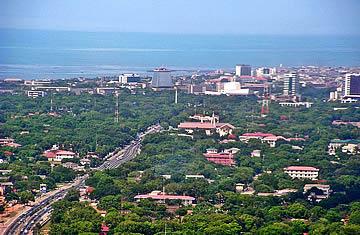Affordable property key to Ghana’s real estate industry
 Aerial view of Accra Central Business District (CBD).
Aerial view of Accra Central Business District (CBD).
Affordability is becoming a major driver in Ghana’s real estate market as the housing sector is not delivering at the rate and scale needed, nor is it serving the diversity of the market.
Jeff Foli, an equity trader and real estate specialist, and the executive director at Bullion Securities, believes that it is at this end of the market where the opportunity for property development really lies.
“In terms of commercial and residential property, I would say 85 per cent of the supply that’s been coming into the market has been designated for the higher end of the market. A standard two-bedroom apartment, we’re talking around 300,000 US dollars and upward, a commercial office space, we’re talking around 40 US dollars per square meter, retail space – we’re pitching between 50 to 65 US dollars per square meter,” Foli told AfricaPropertyNews.com.
“There’s a huge gap – 70 per cent of the market represents middle to lower end and it’s this space where, I honestly believe, the real opportunity lies - the affordable space.”
According to The World Factbook, Ghana’s population growth in 2013 stands at 2.19 per cent while its rate of urbanisation, between 2010 and 2015, has been forecast at 3.5 per cent per annum.
“Currently if you look at our business culture as a country, most companies operate from residential homes, so we expect a migration or a transition from companies moving from homes into formal, serviced offices,” Foli explained.
“The general supply has been designated to the high end of the market. While this still represents a healthy double-digit rental yield, one has to be cognisant of the supply that is due to the market or due for completion by the end of 2014. We expect this to have an impact on the residential market.”
The West African nation, which covers a total area of 238,533 square kilometres, has a real GDP growth rate of seven per cent, as of 2012.
Despite a slowdown across all the major sectors of the Ghanaian economy in the first half of 2013, including real estate, Foli indicated that the country’s property market remained resilient.
“Over the past five years, the real estate market has grown on average of around 11 per cent – the Ghanaian stock exchange composite index has also returned the same average over the same period. The reason we like it is that the real estate market is a dollar market, so development prices are dollarised and letting and sale prices are also in dollars. It offers some level of insulation against inflation,” he said.
“If you take the Ghanaian property market as a whole, we could quantify by putting a value of approximately 1.8 billion dollars as it stands. Over the next three to five years, if you take a sensible view, we would expect dollar interests of another billion of investment into the housing market, anything from a billion upwards. This number could grossly increase if some of the pipeline projects happen.”
However, in order to see the success of some of these pipeline projects, the property sector has to overcome a number of decisive challenges.
“The challenges in the property market have been the same challenges which have existed for more than a decade. There are probably three or four, starting with land ownership and land acquisition, which is often lengthy, cumbersome and really needs review and tightening to mitigate fraud. The second challenge I would say is probably support and infrastructure. The infrastructure costs remain high and are still lacking in many parts of the country where, if provided, would service growth,” Foli specified.
“The other challenge is really trying to make inroads to provide affordable housing for this middle-lower end of the market which is enormous. Real estate, to work on a national level, requires some legislative changes or some sort of government intervention, which is not unusual.”
Foli maintained that if Ghana is able to implement a number of key strategies, a sustainable real estate market, which will offer healthy returns in the long term, can be created.
“There has been some improvements. The government is for sure trying to streamline land acquisition, the whole process, to shorten the length and lessen the fraudulent activities. We can also see that more financial institutions are providing some sort of vehicle to assist people to get onto the housing market, but the pace is still quite slow,” he said.
“We really need to look at the property market from a national level – the focus has really been on the capital, which is really what is driving the real estate market. On a sustainable level we need to get interest rates lower, we need to find ways to formalise the informal sector, which accounts for close to 80 per cent of the labour force, so that on an affordable space we can get more people onto the housing ladder.”
Most Popular
Watch: A Credible Market, the need for Standards in Property Industry
Valuation standards have a significant role to play in helping to regulate professional practice at national, regional and global levels, promoting professional ethics, integrity, impartiality and trust in valuer activities in the property industry. ... Full story











